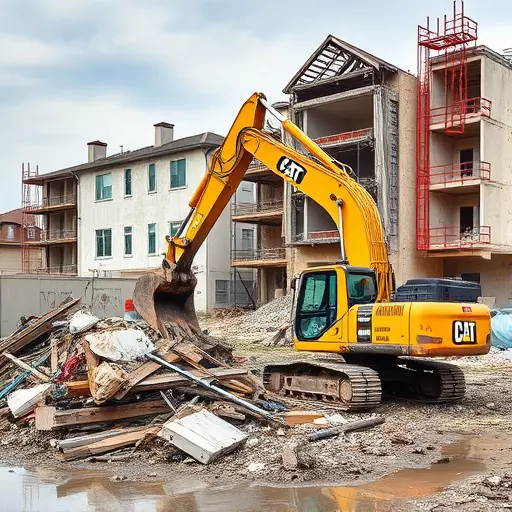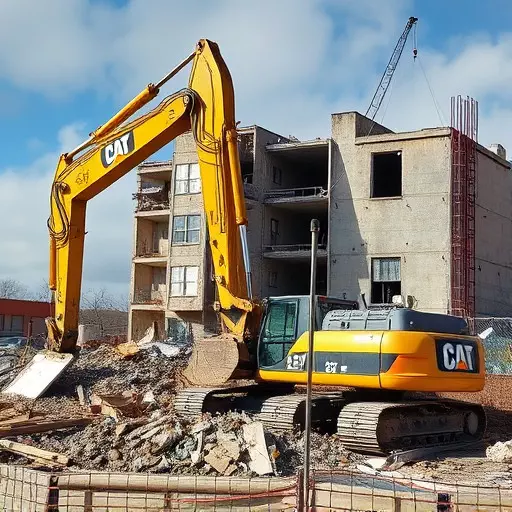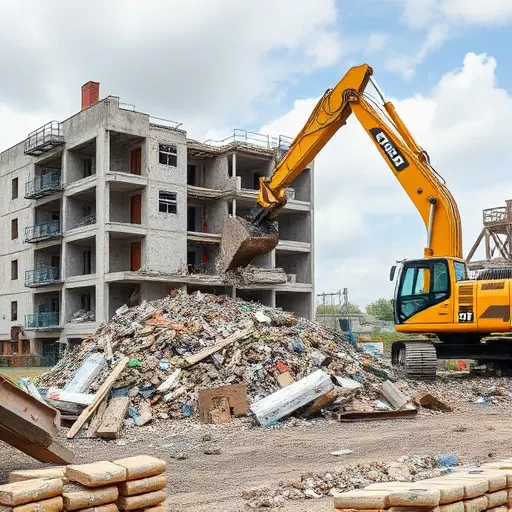Construction material recycling, especially building deconstruction in Toledo, is a sustainable practice that reduces waste sent to landfills and conserves resources. By carefully disassembling structures to recover materials like wood, metal, concrete, and insulation, Toledo promotes a circular economy and minimizes environmental impact from construction activities. This green transformation not only benefits the local landscape but also offers economic advantages through material repurposing and cost savings. Innovative deconstruction methods and advanced technologies are shaping a brighter future for sustainable construction in Toledo.
In today’s eco-conscious world, the recycling of construction materials is no longer an option but a necessity. This comprehensive guide explores the growing importance of construction material recycling, with a special focus on the local context through Toledo’s demolition and recycling services. We delve into the process of building deconstruction for recyclable materials, highlight common suitable materials, and discuss the numerous benefits. Additionally, we gaze into future trends, ensuring you stay informed on this revolutionizing industry.
- Understanding Construction Material Recycling: The Why and What
- Demolition and Recycling Services Toledo: A Local Perspective
- The Process of Building Deconstruction for Recyclable Materials
- Common Construction Materials Suitable for Recycling
- Benefits of Construction Site Demolition Recycling
- Future Trends in Construction Material Recycling Practices
Understanding Construction Material Recycling: The Why and What
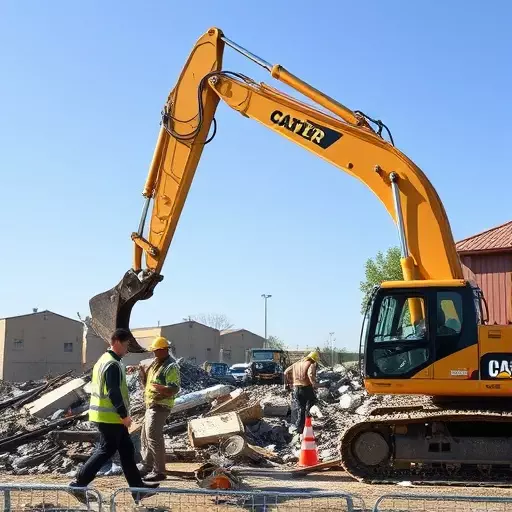
Construction material recycling is a vital process that plays a crucial role in the sustainability of our built environment. With the constant growth and renovation of structures, understanding the importance of demolition and recycling services Toledo offers is essential. The practice involves the efficient removal and processing of materials from construction sites, allowing for their reuse in various applications, thereby reducing the demand for new resources.
Building deconstruction, a specialized approach within this process, focuses on disassembling buildings to recover valuable components like wood, metal, concrete, and insulation. This method not only minimizes waste ending up in landfills but also provides a sustainable alternative for construction businesses and homeowners seeking eco-friendly solutions. By embracing these practices, we can contribute to a more circular economy, ensuring that our urban landscapes evolve while preserving natural resources.
Demolition and Recycling Services Toledo: A Local Perspective
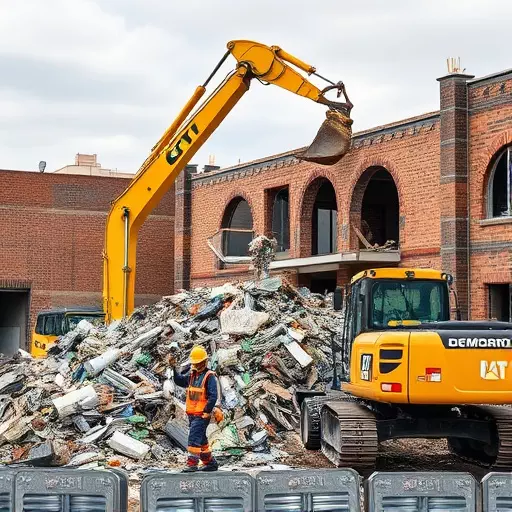
In Toledo, the landscape of construction and demolition is evolving as local businesses embrace sustainable practices, particularly in the realm of building deconstruction and recycling services. This shift is driven by a growing awareness of environmental impact and the potential to divert significant amounts of materials from landfills. Demolition and recycling services in Toledo are not just about breaking down structures; they focus on extracting valuable resources from old buildings, which can then be repurposed, reducing the need for new raw materials.
These services play a crucial role in managing construction site demolition, ensuring that the process is more than just tearing down structures. By carefully deconstructing buildings and separating materials like wood, metal, concrete, and insulation, recycling specialists can prepare these components for reuse or repurposing. This local initiative not only minimizes environmental footprint but also fosters a circular economy, where resources are continually cycled back into construction projects, contributing to a more sustainable future for the community.
The Process of Building Deconstruction for Recyclable Materials
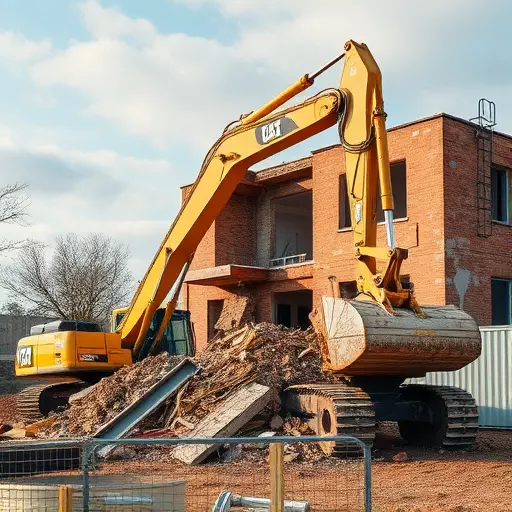
The process of building deconstruction is a meticulous approach that aims to maximize the recyclability of construction materials. It involves carefully disassembling structures rather than simply tearing them down, allowing for the separation and recovery of valuable resources. This method is particularly relevant in urban areas where space is limited, as it enables the reuse of materials on-site or for transportation to recycling facilities without generating excessive waste.
Building deconstruction for recyclable materials starts with an assessment by specialists who identify usable components such as wood, metal, concrete, and insulation. Next, specialized equipment and trained personnel are utilized to safely dismantle structures while minimizing damage to recoverable items. Each material type is then sorted, cleaned, and prepared for either reuse in new construction projects or recycling processes. This approach not only reduces the environmental impact of construction but also provides a sustainable solution for both demolition and recycling services Toledo residents and businesses can rely on.
Common Construction Materials Suitable for Recycling

Construction sites generate a significant amount of waste, but many common materials used in building projects can be suitable for recycling. One of the primary benefits of integrating demolition and recycling services Toledo offers into construction site operations is the reduction of environmental impact. Materials like concrete, asphalt, wood, metal, and brick are frequently found on construction sites and have various potential recyclings lives.
Building deconstruction plays a crucial role in this process by carefully separating these materials before they are sent to landfills. For instance, wood from demolished structures can be recycled into particle board or used as fuel, while concrete can be crushed and repurposed as aggregate for new constructions. Similarly, metal components from old buildings may be smelted and refined for use in manufacturing new products, closing the loop on material waste.
Benefits of Construction Site Demolition Recycling

The practice of construction site demolition and recycling offers numerous environmental and economic advantages. By utilizing specialized demolition and recycling services in Toledo, construction companies can significantly reduce their carbon footprint. This process involves carefully deconstructing existing structures instead of simply demolishing them, allowing for the retrieval of valuable materials like wood, metal, concrete, and glass. These materials are then processed and repurposed, cutting down on the demand for new resources.
Building deconstruction also minimizes waste that ends up in landfills, which is a significant step towards sustainable construction practices. It provides an opportunity to recover materials that can be sold or reused, leading to cost savings for businesses and potentially lower project expenses. Moreover, it contributes to a circular economy by extending the lifespan of resources and reducing the energy required to produce new building materials.
Future Trends in Construction Material Recycling Practices

The future of construction material recycling looks promising as the industry continues to evolve with innovative practices and advanced technologies. One notable trend is the increasing popularity of building deconstruction, which involves carefully disassembling and sorting materials from existing structures instead of traditional demolition methods that often lead to more waste generation. This approach not only reduces the environmental impact but also provides a valuable source of raw materials for new constructions.
Additionally, there’s a growing emphasis on optimizing recycling processes to maximize resource recovery. Advanced sorting technologies, such as robotic systems and artificial intelligence, are being integrated into demolition and recycling services in Toledo to improve efficiency and accuracy. These innovations ensure that various materials, from concrete and steel to wood and insulation, can be seamlessly separated and prepared for reuse or repurposing, further promoting sustainable construction practices and minimizing the need for new resource extraction.
